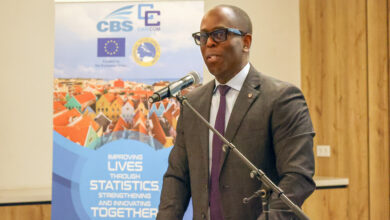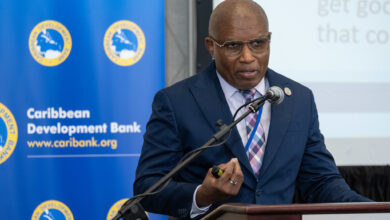The last six months during which I had the honour of holding the Chairmanship of the Conference of Heads of Government of the Caribbean Community (CARICOM) have been a period of introspection, hope and modest accomplishments.
In handing over to my friend and colleague the Prime Minister of St. Kitts and Nevis, the Honourable Dr. Denzil Douglas, I feel confident that his vast experience in regional matters and his immense skill in achieving consensus, will ensure that our Caribbean Community continues on a path of progress and development.
I extend warmest congratulations to the newly appointed and to the recently re-elected Heads of Government and welcome them individually to this Thirty-Second Meeting of the Conference.
In this respect, I am pleased to greet the Honourable Freundel Stuart, Prime Minister of Barbados, H.E. Mr. Michel Martelly, President of Haiti, H.E. Desire D Bouterse, President of Suriname and Hon. Paula Cox, Premier of Bermuda. I trust that our encounter and engagement at this high level of regional governance would bring you great satisfaction.
Please allow me the opportunity to extend a special welcome to His Excellency Michel Martelly, the newly- elected President of Haiti. Excellency, your victory at the polls clearly demonstrates the confidence the Haitian electorate has in you to lead your dear country at this time.
I can assure you that we, your CARICOM colleagues, look forward to the unique perspectives you will bring to assist us in achieving the goals of the integration movement.
Even as we welcome you, Excellency, it is fitting that we recognise the contribution of your predecessor Mr. René Préval, who, in his first term, brought Haiti into our Community; and who has earned the respect and admiration of us all for the calm and dignified manner with which he pursued and promoted the interests of his country, particularly following the devastation of the January 2010 earthquake.
On assuming the Chair last January, I noted that it was almost one year since the devastating earthquake had struck Haiti, but that the lethargy which attended the inflow of the promised funds for reconstruction of the country was, in its own way, almost as tragic as the event itself.
Six months later, despite the strenuous efforts of all, including CARICOM through the Special Representative of the Heads of Government to Haiti, the Most Honourable P.J. Patterson, the situation remains much the same.
It is a woeful indictment on the international community and a major disappointment to us all. Nevertheless, we must maintain our diplomatic efforts in this important regional cause.
Meanwhile, it is worth noting that the Caribbean Community has been doing its part to spur on economic resuscitation in its Member State.
One example of this occurred last April when my country Grenada received the first shipment of Haitian goods under a three-year non-reciprocal trading agreement between Haiti and the other Member States forming the CARICOM Single Market.
Colleague Heads, ladies and gentlemen, I mentioned earlier that the past six months have been a period of introspection, hope and modest accomplishments.
This climaxed six weeks ago at a Special Retreat in Guyana, at which we identified areas for priority action in order to deliver tangible benefits to the regional population and also demonstrate the value of regionalism in ways that touch on their daily lives.
Our responsibility to address the ‘ Implementation Deficit’ remains. It is my hope that this Meeting of Conference will provide a further accounting to the people of the region on those matters that are important to them and for which they desire movement from being a paper agenda to a positive and purposeful delivery agenda.
Integral to accomplishing that objective is the CARICOM Secretariat. The review of the Secretariat which was mandated at our last Regular Meeting is underway and the consultants undertaking that review will be briefing us on their recommendations thus far.
Relatedly, the selection of a Secretary-General will engage our attention during this Meeting of Conference.
I take this opportunity at this time to recognise the former Secretary-General, Sir Edwin Carrington who, later this evening, will be duly honoured for his service to our Community – an honour that is richly deserved.
Within the CARICOM Quasi-cabinet, I have the honour to be responsible for Information and Communications Technology (ICT).
As we look to position ourselves in the global arena, ICT can serve as a critical driver for our development both as an enabler and a sector in its own right.
ICT presents limitless opportunities for countries like Grenada and several others within our Community with limited natural resources.
ICT is also a platform upon which real growth and development can be achieved in all sectors. While it is already an integral part of our business and social lives and is deeply set in the psyche of our youth, we must take appropriate steps to exploit its limitless potential as a catalyst for our development.
There must be a concerted drive for example to increase accessibility not just to the internet, but to broadband services, to ensure the high speed connections which are crucial to the full exploitation of the opportunities available.
In this regard, we look forward to the establishment of C@ribNet by the Caribbean Knowledge Learning and Network Agency (CKLNA) which holds great promise for linking the Region among ourselves and with similar networks globally.
The CKLN is not an isolated effort on our part in this field. Just last month in Grenada, the Draft Regional Digital Development Strategy was presented to our Member States.
I urge us all to study it carefully and with urgency. We are starting late in this race but I am confident that the ingenuity and creativity of our people will make us winners in the shortest possible time.
In conclusion, I am convinced that solutions to our challenges are achievable if we believe unwaveringly in our integration movement; if we are prepared to use all the skills and tools at our disposal to build a strong, viable, prosperous Caribbean Community and if we put on the armour of regionalism to combat our national shortcomings.
There must be a strong regional dimension in articulating our development goals as we go forward.
With determination we can create an environment where our people feel they are a part of one integrated Region. That is the legacy that we must leave for our children and their children.
I thank you.





